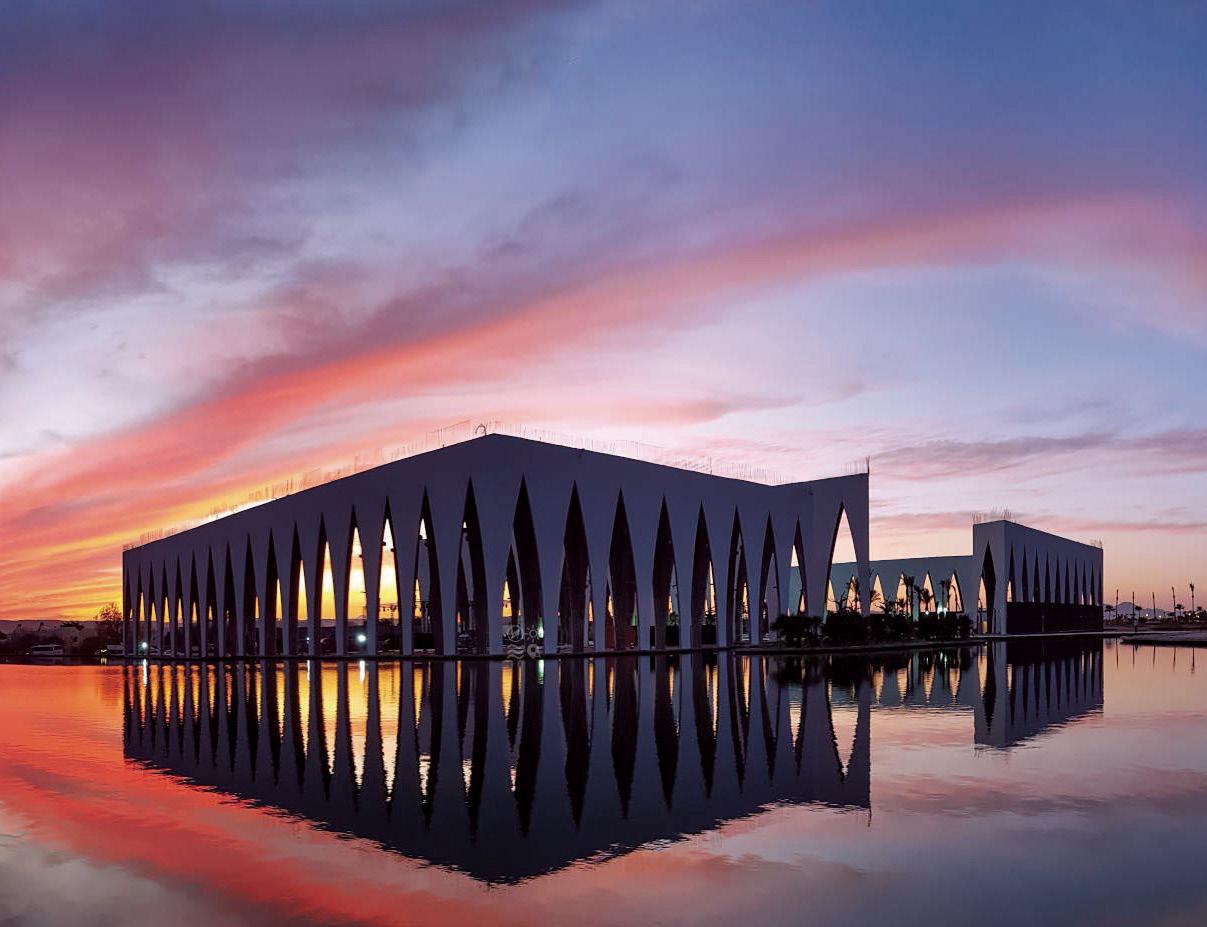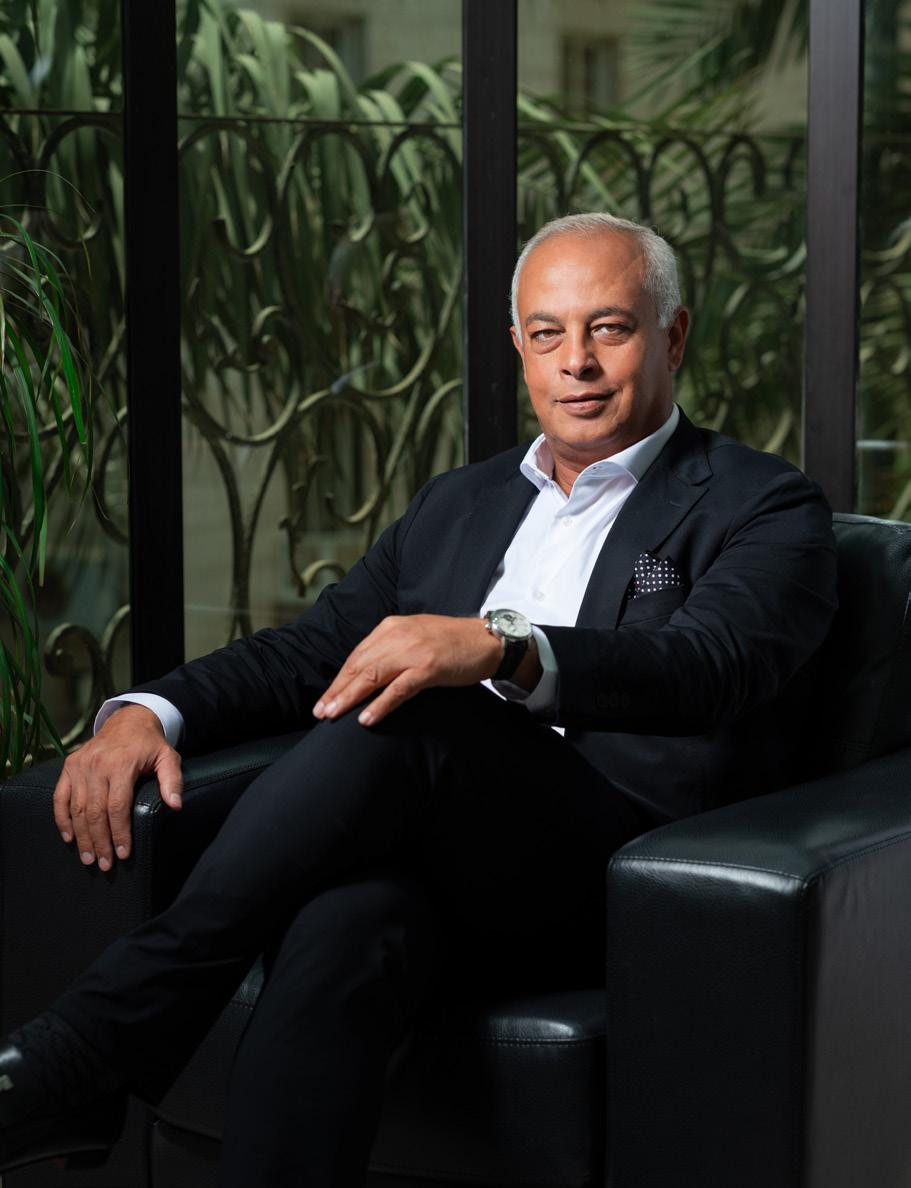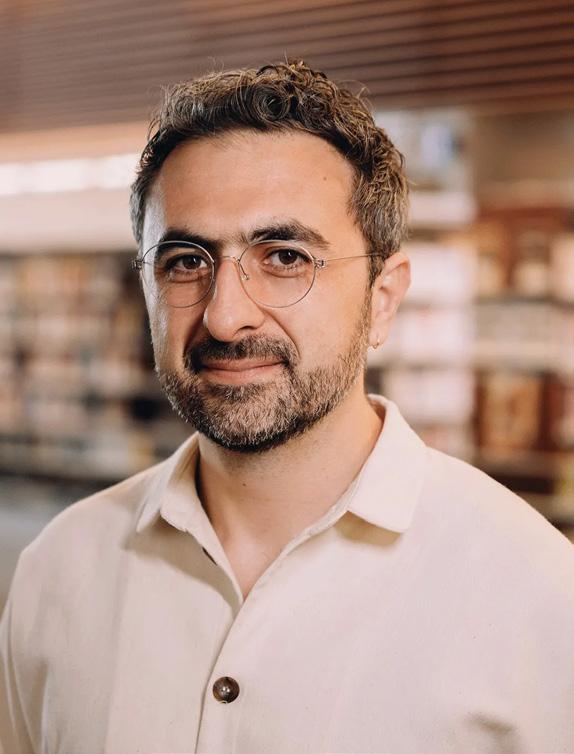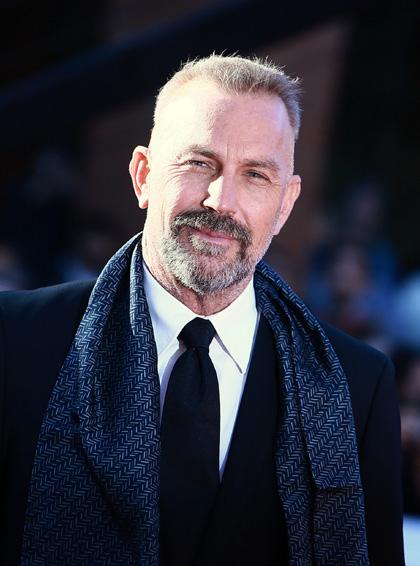
7 minute read
GOING STRONG
Hassan Allam Holding’s third-generation leaders, Hassan Allam and Amr Allam, the Co-CEOs of the group, have been overseeing their family business since 2009 and 2010, respectively. They are now focused on expanding the company’s operations, leveraging hitting $5.5 billion in backlog in 2022.
BY HAGAR OMRAN
While being lucky enough to be born into a thriving family business may seem like a guaranteed path to success, the truth is that there are no guarantees. According to Deloitte, more than 70% of family businesses fail before reaching the third generation. That is not the case for Hassam Allam Holding, an Egyptian construction, engineering, and utilities company. Now under the leadership of two of the founder’s grandchildren, it has been growing at a rapid rate for over 87 years. The group’s backlog has grown over tenfold in the last 13 years alone, from $500 million in 2009 to $5.5 billion in 2022.
Hassan Allam and Amr Allam, the group’s Co-CEOs, attribute the success of the family business to institutionalization and sound governance. “Any family business that isn’t institutionalized will be restricted in terms of growth and success,” explains Hassan. “The right governance and organizational structure help businesses succeed and operate as an institution rather than a family affair.”
The group’s founder, Hassan Allam, started the family enterprise as Hassan Mohammed Allam & Co. in 1936 after quitting school to join his father’s small shop selling construction materials. The construction of El Kassaseen Hospital on the Cairo-to-Ismailia agricultural road was Hassan Allam’s first major contract. In 1964, the company was fully nationalized and became Nasr General Contracting. However, in 1975, the investment and legislative climate in Egypt changed, allowing the private sector to re-emerge, and the founder established a new entity, which is what is known today as Hassan Allam Holding.
Today, the group employs 45,000 people and operates across 18 subsidiaries in several countries, including Egypt, Saudi Arabia, Oman, Jordan, Libya, DRC, Algeria, Germany, and Iraq, focusing on engineering, construction, investment, and development.
Hassan joined the construction arm of Hassan Allam Holding in 2002 and held several positions in the construction division, including Operations
Director and Managing Director, before becoming the CEO in 2009. Amr Allam started his career in 2004 by joining the Consolidated Contractors Company as a project engineer. In 2007, he joined Hassan Allam Construction as head of new businesses. He became co-CEO of Hassan Allam Holding in 2010.
The brothers divide their responsibilities. While Hassan oversees construction and engineering in addition to supervising strategic plans, business growth, and international expansion, Amr is more engaged in spearheading the evolution of the group’s corporate strategy and expansion through new investments, including launching Hassan Allam Utilities, Hassan Allam Holding’s investment and development arm, in 2017.
“The most successful families have struck the right balance for prioritization across the areas of succession, in-house governance, board composition, cyber, and tax, and they have taken action accordingly,” says Scott Whalan, Partner at Deloitte Middle East. “Throughout the ongoing transformation journey many Middle East family enterprises are experiencing, communication remains a core element proven to be essential in helping minimize obstacles along the way. Open and honest communication amongst the family; amongst the board, management and independent directors; and amongst advisors supporting the transformation.”
According to Hassan, favorable market conditions in Egypt have also helped Hassan Allam Holding’s growth trajectory as it capitalizes on emerging prospects to enhance its market position. During the 2009-2010 financial year, Egypt’s GDP grew by 5.1%. The International Monetary Fund expects growth of 3.7% for the 2022-2023 financial year, followed by 5% growth in 2023-2024. This is still a slowdown from the 6.6% growth rate achieved in 2021–2022.
Hassan Allam Holding has been engaged in a wide range of local and regional diversified projects that have supported its long journey. The group’s current project portfolio includes the first phase of the Cairo Metro Line 4, which the company is undertaking in partnership with Arab Contractors and PETROJET as part of an Egyptian consortium. The Ministry of Transportation is overseeing the ambitious project, which is being partially funded by the Japan International Cooperation Agency (JICA). The project involves constructing 12 metro stations by 2027, spanning a total length of 13.70 km, from 6th October City to Al-Haram Street in Giza. “JICA has committed to finance the Cairo Metro Line 4 by an amount of $1.3 billion (JPY 173.72 billion). Work is now progressing in the stations after having started in November 2020,” says Kato Ken, Chief Representative of the JICA Egypt Office.
JICA and Hassan Allam Holding are also cooperating in another key project—the Grand Egyptian Museum (GEM), which Legacy—a Hassan Allam Holding subsidiary— is operating. The project is currently in a soft opening phase and is expected to be fully operational in 2024. “JICA has been providing comprehensive support to the GEM since 2006 through two ODA loans of total about $600 million (JPY 84.2 billion) for the museum construction and consulting services. This, besides several technical cooperation projects, including support to the GEM Conservation Center to become a global center of advanced conservation techniques and research in the field of archaeology,” adds Kato.

Hassan Allam Holding is having a significant impact on Egypt’s infrastructure through its subsidiaries. In the logistics and transport field, Hassan Allam Roads and Bridges is currently working on the North Luxor axis project that will connect the Eastern and Western Desert Roads, passing across the Eastern and Western agricultural roads and the Nile River. The project includes one main bridge crossing the Nile River and ten other bridges for the intersections, with a total length of 2.5 km, connected through road networks spanning 16 km. This will enhance traffic circulation, improve overall accessibility, and bolster the tourism sector after it is completed by the end of 2023.
In March 2023, Hassan Allam Utilities agreed to work with Kuwait-based Agility to establish a joint venture, YANMU, to develop, build and operate modern logistics parks and warehousing facilities in Egypt. YANMU Logistics Park is 51% owned by Hassan Allam Utilities and 49% by Agility. “YANMU facilities are specifically designed to cater to the quality handling and close proximity needs of numerous sectors, such as e-commerce and FMCG. Looking ahead, our vision for 2023 involves investing approximately $100 million into YANMU, with plans for further expansion in 2024,” says Dalia Wahba, CEO of Hassan Allam
Utilities. The first park, YANMU East Logistics Park, a 270,000 sqm site located on the new Cairo Suez Road, 15 km from Cairo Airport, is 40% complete and expected to be completed in early 2024, with the YANMU West Logistics Park planned to launch next year. Hassan Allam Utilities is looking to expand its greenfield logistics parks portfolio to around four parks, according to Amr, with $500 million of investments set aside. “2022 was a year for logistics. It is a promising sector with a lot of opportunities in Egypt and the Middle East,” he adds.
Then, in April 2023, Hassan Allam Utilities jointly launched a $250 million multifaceted logistics platform for warehousing services in Egypt with Denmark-based A.P. Moller Capital. This move came after the two companies jointly acquired a 51% stake in Cairo Airport
Cargo Company for an undisclosed sum earlier in the year. The partnership aims to attract $200 million of direct investments into the logistics, freight, and warehouse industries in Egypt.
The family business is also looking at sustainable projects for growth. In November 2022, Hassan Allam Utilities, the Abu Dhabi Future Energy Company (Masdar), and Infinity Power Holding signed a framework agreement with the Sovereign Fund of Egypt to develop a two-gigawatt green hydrogen project in the Suez Canal Economic Zone. The project is expected to be operational by 2030, with an output of up to 480,000 tonnes of green hydrogen per year. In June 2023, the three companies also signed an agreement with Egypt’s New and Renewable Energy Authority to secure land to build a 10-gigawatt capacity onshore wind farm in Egypt, set to be one of the largest in the world, with a project value of more than $10 billion. Hassan Allam Holding is also developing a 1.1 GW wind project in Egypt at an investment value of $1.5 billion in cooperation with ACWA Power. “This project will be the largest wind farm in Africa. The plant will be commercially operational by 2027 at the latest,” says Amr. Toshka, the New Delta Wastewater Treatment Plant, and the Black Sand Minerals Complex are also among the group’s key construction and engineering projects.
Outside of Egypt, the group’s Bioworks subsidiary in Germany is engaged in engineering, procurement, and design work.
Hassan Allam Holding also signed an MOU with U.K. Export Finance in January 2023 to seek mutual opportunities for cooperation in Africa. And the group is working closely with other international institutions, including the International Finance Corporation and the European Bank for Reconstruction and Development (EBRD). IFC invested $20 million in Hassan Allam Holding in December 2016, and in 2019, Hassan Allam Holding signed a $20 million loan from EBRD to support the construction and utilities sectors and help the group invest in the water space. “EBRD is currently one of our development partners in terms of debt across different sectors. We’re in discussions with them on equity investments,” says Amr. Other international projects include a large sewage line infrastructure project in Jordan and a solar power plant in the Democratic Republic of the Congo.
Hassan Allam Holding’s diverse portfolio of projects is underpinned by the Egyptian government’s continuous efforts to enhance the country’s business climate. Egypt attracted $11.4 billion in foreign direct investment in 2022, marking the highest amount since 2017, according to the United Nations Conference on Trade and Development. “Despite the challenging global environment, there is a strong interest from international investors in Egypt, alongside local players,” adds Amr. Yet high inflation and price increases in raw materials and commodities are affecting businesses across all sectors, and construction and investment are no different. Egypt’s annual core inflation rate hit 41% in June 2023, from 14.57% a year earlier. “We had to renegotiate prices after the price hikes, and a lot of our clients have been reasonable and understanding,” explains Hassan. “We’ve had a healthy dialogue whereby we mutually agree to revise pricing that allows us to maintain a healthy business.”
Looking ahead, the co-CEOs are continuing to explore more diversification and growing the company’s regional footprint. In construction, they aim to boost current businesses rather than adding new subsidiaries, while on the investment and development side, the focus will be on growth through new acquisitions and greenfields. Fitch Solutions expects Egypt’s construction sector to grow by 6.8% in 2023 and by an average annual rate of 7.4% from 2024 to 2027, helped by the government’s privatization efforts. “Local blue chips, including Hassan Allam Holding, will benefit from Egypt moving in the right direction,” says Hassan.









